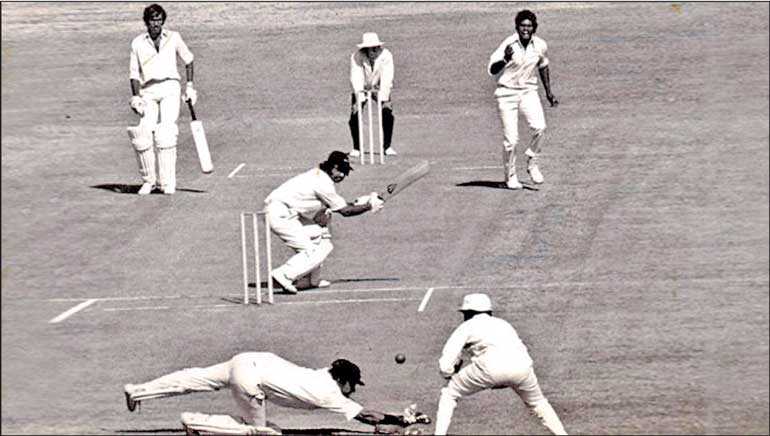Monday Feb 23, 2026
Monday Feb 23, 2026
Saturday, 12 September 2020 00:22 - - {{hitsCtrl.values.hits}}

Wicket-keeper Ranjith Fernando drops Indian batsman Gundappa Vishwanath off the bowling of Tony Opatha in the unofficial test played during the tour of India in 1975
By Sa’adi Thawfeeq
|
Tony Opatha
|
Tony Opatha, one of the greatest fast-bowling all-rounders Sri Lanka cricket has produced during the pre-test era, passed away yesterday at the age of 73 after a brief illness.
Opatha was what Chaminda Vaas was to Sri Lanka in the test era; a wonderful athletic right-arm fast-medium bowler who could swing the ball both ways and also score valuable runs down the order.
Opatha was the spearhead of the Sri Lanka bowling attack for a decade from 1970 till his retirement from international cricket after the 1979 World Cup. He had some outstanding performances with the ball, taking 6 for 91 (match bag 8/168) and scoring a useful 33 in the drawn first unofficial test against Pakistan in Lahore in 1974. In the second unofficial test at Karachi, Opatha took four wickets and nearly steered his team to victory. Sri Lanka chasing 176 runs for victory fell short by 17 runs with Opatha being last man out for 32 battling against heavy odds like sandstorm which made batting extremely difficult.
Pakistan great Zaheer Abbas mentioned in his autobiography ‘Zed’ that Opatha was the best fast bowler he had ever faced.
Opatha followed this up with a sensational bowling performance against a strong West Indies side led by Clive Lloyd at the P. Sara Oval in 1975. He took four wickets for 35 runs off 13 overs to reduce the powerful batting line up to 119 all out in the first innings. Amongst his victims were four of the top five batsmen – Roy Fredericks, Alvin Kallicharan, Viv Richards and Lloyd. The match ended in a draw. Touring India that same year Opatha hit his career best score of 61 to help Sri Lanka avoid an innings defeat in the first ‘test’ at Hyderabad. He scored another unbeaten fifty (55) in the second ‘test’ at Ahmedabad.
“I have bowled every first three batsmen in the world. It doesn’t bother me whether it is Zaheer Abbas, Majid Khan, Viv Richards, Alvin Kallicharan, Roy Fredericks or Clive Lloyd when I play I think the batsman is just another cricketer. I’ve always had loads of confidence. If you are a good cricketer you must be able to bowl on any batting or bowling wicket. The state of the wicket never bothered me. When I got onto the field my job with the new ball is to get the first three or four batsmen out which I often did. I have been always a cocky and confident cricketer in whatever I do,” was how Opatha described himself in an interview.
One of his contemporaries, David Heyn, paying tribute to him, said: “Tony got a lot of runs he was one of our better fast bowlers, wasn’t so fast as such but he was very accurate and very intelligent. A very good cricketer he produced the goods on many occasions the highlight was the game against West Indies in the second test in 1975. He was one of the best cricketers of my era who could have fared well even in this era of cricket.”
Ranjith Fernando, who kept wickets to Opatha for NCC and Sri Lanka, said: “He was one of the greats we had at that time. His bowling performance against the West Indies was one of his best. He was medium to fast, and he was impeccable in his line and length, and he was an intelligent bowler. He was never someone who shied away from a batsman he would take them on and challenge them. Even as a batsman, he was not technically sound but he made runs. In his time he was undoubtedly the best.”
Opatha captained St. Peter’s in 1967 and won the Big Match against St. Joseph’s, taking seven wickets. He started off as a wicket-keeper and then bowled off-breaks before Dr. H.I.K. Fernando, who was the coach of St. Peter’s told him to bowl fast because of his height, and from there on his career took an upward curve. He later coached both schools.
He broke into club cricket with Saracens SC. “While I was in school, I got an offer to play for Saracens. It was my first club, and Thalaath Ismail was captain with Mohammad Macan Markar as president of the club. I was 17 years old at the time and I got special permission from Father Rector Rev. Mervyn Weerakkody to play because Saracens was a Muslim club and there was no alcohol involved,” Opatha once recalled.
Opatha also played for SSC and then CCC before joining the Air Force and captaining them in Sara Trophy Division I cricket. He also played club cricket for Ireland for one season, and for Holland as player cum coach for 22 years. He returned to Sri Lanka in 2003 and ran his own sports travel company in Holland and in England.
Opatha’s wonderful career was blighted by the rebel tour to South Africa in October 1982, which he and 13 other Sri Lanka cricketers undertook in defiance of the sporting ban against the apartheid state, and was banned by Sri Lanka Cricket for 25 years. Opatha has lived with that stigma till his death being branded as the main figure behind it although he was only partly responsible. “I was only 25% involved with the tour but I will take the blame because I will not let my friends down,” Opatha said. He leaves behind his wife and daughter and three daughters from his previous marriage.
His remains will lie at AF Raymond funeral parlour from today and the funeral will take place on Sunday at the Borella Cemetery.